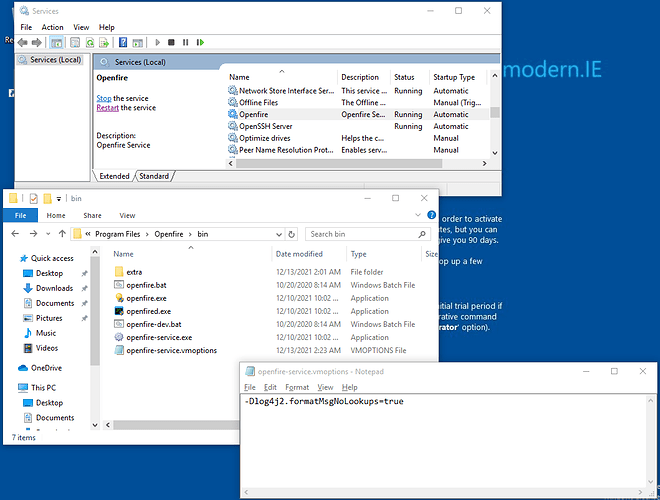Although we’re preparing for the Openfire 4.7.0 release, the recently discovered vulnerability in the Apache Log4j utility prompted us to push an immediate release of Openfire to address that issue. This release, Openfire 4.6.5, is available now.
We urge you to update as soon as possible. If that’s not feasible, then we advise you to apply the documented workaround (in the form of adding the following argument in the start script for Openfire: -Dlog4j2.formatMsgNoLookups=true) and/or look into applying other mitigating actions.
The process of upgrading is outlined in the Openfire upgrade guide. Please note that, if desired, a significant amount of professional partners is available that can provide commercial support.
You can find Openfire release artifacts on the download page. These are the the applicable sha256sums:
926e852abfe67970a4a64b7a58d16adbd3ae65269921288909d2a353457ac350 openfire-4.6.5-1.i686.rpm
5041fd66f5cf4642d25012642d827ad80c40057ba66f79aad04918edc94085ec openfire-4.6.5-1.noarch.rpm
f1d7ed2d5d5bbd12c3af896329df48f97b73ae5435980b524248760a246552f6 openfire-4.6.5-1.x86_64.rpm
da113f737514457209194024f57a90f52f499fefbf0a9eb3e3d888b24f214ece openfire_4.6.5_all.deb
c16e13348767b489aef905d912eafca9650428af16a729b63a208fdbe97c9783 openfire_4_6_5_bundledJRE.exe
e03cd4e5b2a76b203540580ca2714541ee86b1ef3b677d5c312d099567674f2d openfire_4_6_5_bundledJRE_x64.exe
28d628db9cce3cfb7acfa19977235b569729bcebff65a511dd882a4c1b554d6c openfire_4_6_5.dmg
cb1c4a5f888cbeeb6bbfd29460c8095941cecddd8c5f03b3d3f1ca412a995e81 openfire_4_6_5.exe
fcc3d45e9b80536b463fedbb959ff1e4f5fc5cef180502f6810c0f025a01f4ac openfire_4_6_5.tar.gz
fe216d1eecb23050ebbf28f7afa8930ca167d99516051c3f5e03d545e183cf4c openfire_4_6_5_x64.exe
fd0f853b249a8853da51b056f1e6b31d04c49763394321dbd60abb8cef9df940 openfire_4_6_5.zip
Apart from addressing the log4j issue, this release includes a small number of other modifications, as documented in the changelog.
We’re always happy to hear about your experiences, good or bad! Please consider dropping a note in the community forums or hang out with us in our web support groupchat.
For other release announcements and news follow us on Twitter

